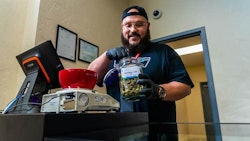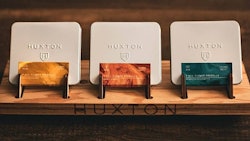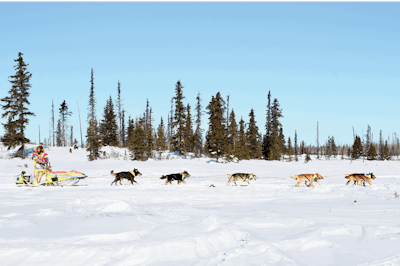
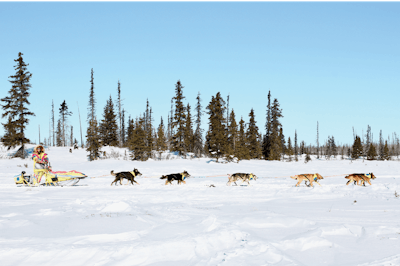
It is a well-known fact that cannabis companies are handcuffed when it comes to how and where they can advertise their products, with regulations that vary greatly by state. With limited or no access to mass media spots available to other mainstream industries, some companies have gotten creative with their marketing strategies.
One such tactic is to sponsor events, which can build a brand’s visibility and its connection to the local community. Amid a plethora of options, choosing which events to sponsor, especially with limited resources to spend, can be daunting.
Leif Abel, co-owner and co-founder of Kasilof, Alaska-based Greatland Ganja knows this well. Being based in Alaska, competition for attention is magnified given the state’s limited and widespread population. (Alaska has a total population of just over 730,000 and a density of 1.2 people per square mile.)
“One of the things I would say about sponsorship in general is trying to determine what your actual return is versus what you put in is actually really, really difficult,” he says. “For example, if you are a prime sponsor of a High Times weed event versus if you’re a sponsor for a local Alaskan music festival, or if you sponsor a band tour versus an Iditarod musher versus a rap video … what most of those share in common is really an inability, from a company perspective, to have really valid numbers to look at.”
While online advertising for an event can produce metrics such as web page hits and social media engagements that can offer some insight, how those translate into sales can still be unreliable and messy to track.
Abel and his family-owned operation have both hit and missed on several sponsorship deals his company struck with cannabis event organizers, touring bands and local events. Here, he and Greatland Ganja’s creative director, Chevelle Abel (his sister), share their insights for how they find—and create—a good return on investment for their sponsorship deals.
Tip 1: Choose sponsorships that allow you to stand out—and keep it local.
Greatland Ganja no longer sponsors any cannabis-specific events—there is simply too much noise and not enough space for the company to stand out among competitors, according to the team.
“It does us little good to go and spend a bunch of money where the only people at the event are a lot of out-of-state companies or a bunch of other cultivators where the general public is really low in attendance,” Leif says. “When we’re doing our mass-direct marketing out there, we’re really targeting the end consumer. And most of those cannabis events are not filled by the end consumer.”
Greatland Ganja has found more success in sponsoring local events that expose the company to a local consumer base that might not already be familiar with its products. For example, the company sponsored the Trapper Creek Music & Arts Festival, which takes place in Trapper Creek, Alaska. The company also sponsored a dogsled driver, known as a “musher,” in this year’s Iditarod race, the annual, 1,000-mile dogsled race from Anchorage to Nome.
“We chose to sponsor a team in the Iditarod because it seemed like a unique opportunity to reach our customer base,” Chevelle explains. “We’re an Alaskan company at heart, and there aren’t many scenes that are more quintessentially Alaskan than the one that surrounds ‘The Last Great Race on Earth,’ if any at all.
“Motivation and determination are qualities we recognize as essential to success in this life, and [musher] Monica Zappa definitely embodies them, so when she presented the idea of the sponsorship to the Greatland Ganja team, we were excited at the possibility. We had not heard of another cannabis business race sponsorship and felt we could stand out a little from the crowd.”
“We love sponsoring local,” Leif says, because “you have to promote your own community.”
Tip 2: Clearly spell out and write down exactly what each side expects from the sponsorship.
“Handshakes don’t usually make great contracts,” Chevelle says. “For instance, one person’s idea of consistent communication might not be another’s, and things can get sticky if you just assume you both define them the same way.”
Even when a sponsorship deal seems small, having a paper trail avoids any confusion about what both parties expect. Signed contracts might seem like overkill, especially if you’re dealing with an upstart band or event, but they avoid problems and disagreements down the line.
And the same goes for the companies making promotional items you plan on handing out at the event. “It’s also important to know the quality of the promotional products you’re ordering. … It would be heartbreaking to blow a photo up 6 feet high only for it to be out of focus, or to have a batch of key chains come in entirely different than you’re expecting,” she says. “Customers do not hold on to cheap, flimsy promotional products, and you want to avoid seeing them on the ground or in the garbage, so it’s very important to have a good relationship with your printer.”
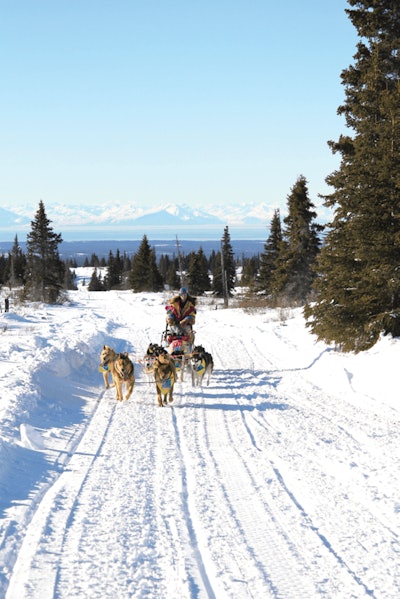
Tip 3: Designate a team member to oversee the sponsorship deal.
Having one person manage your sponsorship deals will help streamline the process for all parties and helps prevent messages from falling through the cracks, according to the Greatland Ganja team. “The person/persons you are sponsoring will get very busy before events, and if there are several folks trying to get a hold of them from the same company, that can become overwhelming very quickly,” Chevelle says.
The workload to oversee such deals is not insignificant, so having one person tasked with that lightens the load on the rest of the team, Leif says. “That design, ordering and administrative and creative workload is 90% on us.”
He adds, “as a business, when you’re looking at sponsorships, you either want to look for sponsorships where they’re offering to do more of the work for you, or where you’re willing to at least monitor them closely.”
One important reason to stay on top of your partners, Leif says, is to ensure they are keeping to their end of the agreement, producing the right materials and using the right logos.
Tip 4: Align yourself with events and groups that reflect your values and can accommodate your needs.
Greatland Ganja places a premium on working with good people, not just groups with large followings.
“Cannabis business owners should look for accommodating and friendly people who portray the themes they are also trying to represent to their customers. If someone is not a good communicator or not easy to be around, you are going to ultimately lose out on the situation,” Chevelle says. “For example, if the artist/entertainer/athlete is too busy to interact or is rude to you, it would be unwise to give them a chance to be the same with one of your customers.”
Both advise to not look at sponsorships as favors to the groups you are sponsoring. Make sure your partners understand that you’re a business looking to get value. One good place to start that conversation is social media.
“Social media is key. Request that posts about your sponsorship be created up to and even after the event you’ve sponsored. Shout-outs from [groups you sponsor] are important because they keep your company on the minds of their fans,” Chevelle advises.
Tip 5: Get Involved
Leif stresses the importance of attending events that your company sponsors and to get involved with passing out materials and talking to people. “If you’re going to have to monitor it anyway, you might as well do a little bit of the work, because it’s really hard to monitor something when you could actually do it [instead],” he says.
One of Greatland Ganja’s most successful events was one that it organized itself: a “Budtender Bake,” where it hosted and celebrated with, and gave products to, representatives from the state’s 50 dispensaries.
“We covered all the costs,” Leif says. “We had a bunch of musical acts, we catered it, gave them a bunch of food. They were able to camp out overnight, so they weren’t drinking and driving. And because it was a private event, we were all able to share up to an ounce with individuals, so everybody got to consume as much as they wanted. Nobody has ever seen anything like it. All of the retail budtenders were talking about it for a month afterwards, even six months later.”
That event garnered new business for Greatland Ganja, and even saw dispensaries that had stopped carrying the company’s product return as clients. It was an unabashed success, according to the team.
“Realize that when you’re in control, you’re going to get more of your value,” Leif says.









